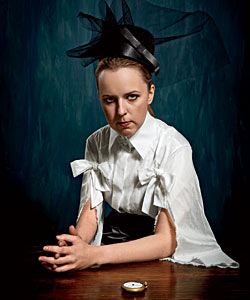Who is Lovecraft?
Howard Phillips (H.P.) Lovecraft (1890-1937) was a writer from Rhode Island whose biography is both interesting and controversial, but for our purposes, we will contain ourselves to his writing. A fan of Poe, he was fascinated with the macabre and horror, and made most of his income came from pulp fiction magazines of the day. His writing includes such themes/ideas as: exploration of places man has never been or has not seen since a bygone age, fear of the unknown and with it a fear of knowledge/progress into areas man is not ready to know, madness and/or death at the hands of things the human brain cannot comprehend nor even contend with, the kind of sacrifice required to forestall humanity's end against forces that it has no hope against and prodigious use of words and phrases like “Cyclopean” “Eldritch” and “Non-Euclidean Geometry” to fill in the gap between where the English language could not describe something ended and the readers imagination began. All of this lead to what we now call the ‘Cthulhu Mythos’.
What is the ‘Cthulhu Mythos’?
The name is inspired from one of Lovecraft’s best (or at least most famous) work: “The Call of Cthulhu”. As to the ‘Mythos’ part...
Well, lots of pulp fiction writers of the day corresponded with each other (to both collaborate and commiserate on how hard it was to make a living writing) and Lovecraft ended up with a large circle of correspondents/fans/friends ( called, rather blandly “The Lovecraft Circle”, which included famed writer Robert E. Howard, creator of Conan the Barbarian) and most of them either saw a gap in the market or were truly inspired by his writing to add to it, helping make one of the largest author approved fan fiction groups ever. Writers would take stories, single lines from stories or just an idea and expand them to where today, their writing is considered as canon as Lovecraft’s by most fans.
Okay, so a bunch of writers made up spooky stories around a hundred years ago. Surely no one talks about it anymore, right?
That is where you are wrong, you cheeky, hastily conjured straw man! The Mythos is still with us and is a part of popular culture to this day, including, but by no means limited to:
Evil Dead Series: Both the more recent TV show and the original movies owe much to Lovecraft, especially the Necronomicon (which is featured/mentioned in many Mythos texts).
Re-Animator: A series of horror movies starring Jeffery Coombs, the original is based wholesale on a Lovecraft story, updated on its era, involving reanimating dead people and the problems it can cause.
Conan the Barbarian: From the novels to the 80s movies with Arnold Schwarzenegger, many of the supernatural/strange elements bear the mark of its creators love of Lovecraft.
Ghostbusters: Mentions some tomes and names familiar to Lovecraft fans and the cartoon version (The Real Ghostbusters) had an episode entitled “The Collect Call of Cthulhu” as a wholesale homage.
John Carpenter: Parts of the film “The Thing” that are not based on the previous version or its original short story are cribbed from Lovecraft’s story “At the Mountains of Madness;” which is even further referenced in style and tone in one of Carpenter's other film “In the Mouth of Madness”.
Metallica: Has two songs referencing Lovecraft ‘The Thing That Should Not Be’ and “The Call of Ktulu’.
Batman: The Arkham Asylum where most of Batman’s rogues gallery ends up is a reference to a central location in the Cthulhu Mythos, the tiny New England town of Arkham, Massachusetts.
Call of Cthulhu: A Tabletop Role Playing Game that is based entirely on the Mythos, originally published in the 80s, is now in its 7th Edition and still going strong. Famous in its circles for having a sanity mechanic where exposure to the strange and horrifying can leave your character like poor Montcrag.
Stephen Kinghas a soft spot for Lovecraft, even having his main villain in ”The Stand” claim Nyarlathotep as one of his incarnations.
True Detective: Not a Cthulhu Mythos show per se, but it has some references and its bleak tone is exactly what many Lovecraft stories tend to feel like.
Hellboy: Both the movies and the comics are steeped in Lovecraft and eldritch abominations.
Glossary of Terms:
Here’s a glossary of potentially tricky terms, entities and ideas in the show in case you’d like to know what they are:
Shoggoth [Shoe-gauth or SHOW-goth]: A creature created to be a slave race by a species that ruled Earth before the rise of man, they rebelled and now a few of them remain in the dark, hidden places of the world. 15 feet across, they are essentially a cross between a massive ball of living Play-Doh with the bioluminescence and partial consistency of a jellyfish. Able to create/extend tentacle to carry out tasks and can open up multiple mouths across its’ body to speak. As the show points out, also kind of like a ginormous amoeba. First appears in Lovecraft’s “At the Mountains of Madness”.
Elder Sign: A symbol with five branches (sometimes depicted as a tree, but also seen as a star, as in the show), that is the fulcrum for many spells in the Cthulhu Mythos, by acting as a beacon to the Great Old Ones (coupled with intent and sacrifice to power it), who actually make the spell work (most spells in the are prayer/pleas to the Great Old Ones and if they respond favorably, they enact the spell you described in your prayer/plea). Speaking of which...
Great Old Ones: Most of the things that people could call ‘gods” in the Cthulhu Mythos are alien beings, who are so beyond our understanding in terms of powers and existence that we shorthand convert them into gods to avoid having to think about them too hard. Their motives are inscrutable - at best they ignore us and at worst they have plans for us. Most spells or supernatural effects come from them or something that worships them/is aligned with them in some way. A few get a passing reference (Bugg-Shash, Gla’aki, a few others) but any with significant presence in the show will get their own entry.
R’lyehian: The language of the Great Old Ones, first brought to Earth by the denizens of the sunken city of R’lyeh that worship dead Cthulhu. The language cannot be uttered correctly by a human tongue and is only used to attract the attention of a Great Old One when performing a spell/ritual. Most sentences are constructed in a matter of fact, no frills way, as the language has no distinction for parts of speech (nouns, verbs, adjectives and such are all interchangeable) and only two tenses (present and not-present, as the Great Old Ones do not experience time as we do). For instance, the R’lyehian phrase: ‘ph’nglui mglw’nafh Cthulhu R’yleh wgah’nagl fhtagn’ is translated into (correctly structured) English as ‘In his house at R’lyeh dead Cthulhu lies dreaming’ but a direct translation would be “Dead, yet dreaming, Cthulhu waits in his palace in R’yleh’. Both the text and the language first appear in Lovecraft’s “Call of Cthulhu.”
Shub-Niggurath [Shoob-Neeg-er-ath]:‘ The Black Goat of the Woods with a Thousand Young’ as she is often known, Shub-Niggurath is the closest thing in the Mythos to a fertility goddess, having birthed some of the worst entities in existence and continually spawning monstrosities from her massive form as easily as breathing, many times absorbing them back into herself (if they do not grow quickly enough to escape). As a being of life and supposedly having control over all that is flesh, she has a great many worshippers, among both humans and various other alien species.
Nyarlathotep [N-Yar-Lat-Ho-Tep]: ‘The Crawling Chaos’, ‘The God with a Thousand Masks’ and all the names those Masks possess. Was originally the messenger of the Great Old Ones, once upon a time, but these days is known by the sobriquet Nyarlathotep (which is really just the name of one of the Masks he wore in ancient Egypt, roughly translated as “The Black Pharaoh”) and he delights in causing chaos and suffering wherever he is called (no one knows what his true form is and it is possible he does not have one). Unlike most Great Old Ones, he has a great understanding of what humans are and how they behave, and enjoys giving followers and the unsuspecting alike exactly what they ask for (in the most ironic/horrible way possible). The God of The Bloody Tongue is one of his Masks.
Azathoth [Az-a-thoth]: As described in the show, The Daemon Sultan is in fact the first being that ever existed. If one imagines the raw, seething power that must have existed in a single point to expand outwards at the Big Bang, that point is Azathoth (albeit with a face not even a mother could love or even look at without devolving into gibbering insanity and the temperament of the worst kind of Child-King imaginable). He dances in his court surrounded by eldritch beings, playing weird instruments, forever playing for his amusement, lest he grow so bored he unmakes all of existence.
(big thanks to ASM Austin Barnes for the bulk of this document!)



















